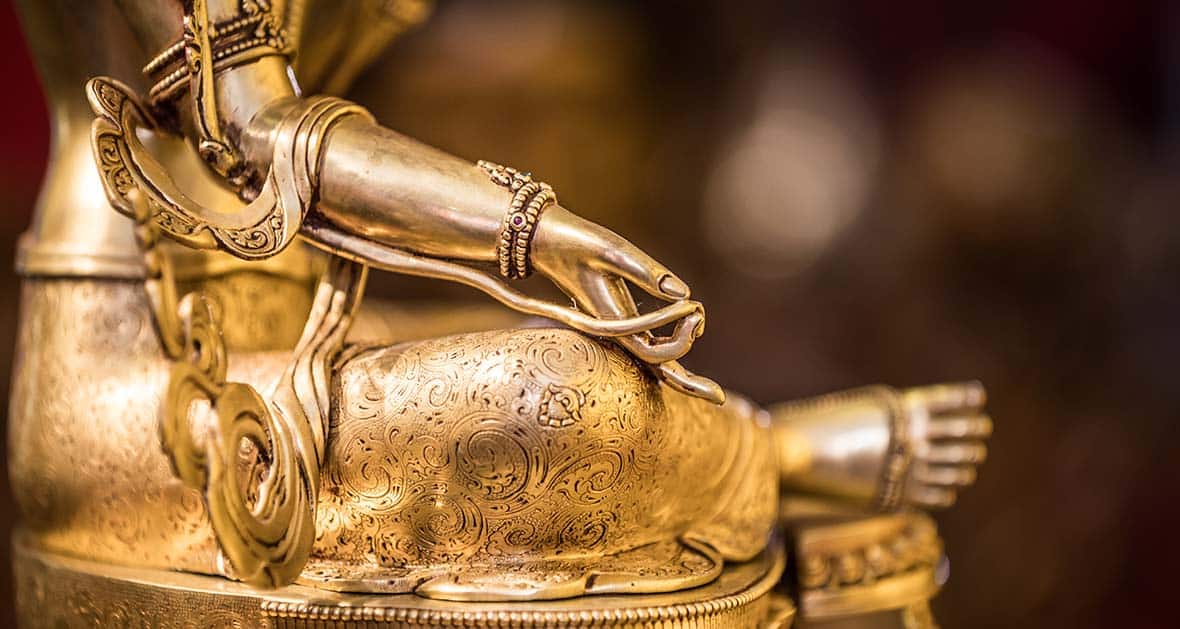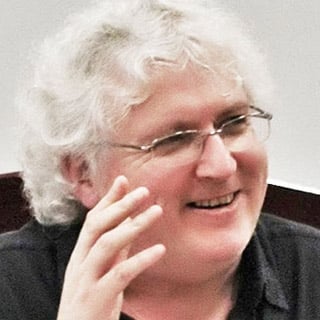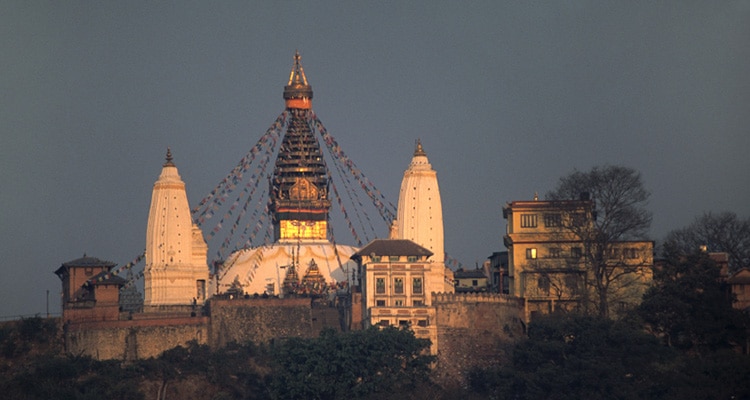The Four Reminders
Category: Buddhist Meditation | Buddhist Path | Mind Trainer Articles

What are the four reminders in Buddhism?
The four reminders or contemplations are very powerful and productive because they lead us to examine what we’ve been doing with our lives and show us how to align our actions with our values and goals. The four reminders may also be translated as the four thoughts or reflections that transform the mind or turn it around. How so? Because they turn the mind away from its narrow limitations towards a deeper and more spiritually authentic life. These four are often prescribed as the first things we should contemplate when we begin to connect with the Buddhist teachings.
What are the four reminders? They are the preciousness of our human life; its impermanence; karma—actions and results; and the suffering inherent in our experience of the world. We’ll discuss them in this order, but they can be explored in any sequence and still make perfect sense.
Precious human existence
Buddhism champions the idea that the potential for awakening is present in the mindstream of every living being. Mind’s fundamental nature is pure, even when mind’s qualities are heavily obscured. To illustrate this, we might use the analogy of a seed. A seed may have genetic potential, but it can’t sprout and thrive unless it’s in the right soil, the right medium. And it would seem that a particular type of human life has certain attributes which makes it the ideal medium for the seed of awakening to come to fruition.
Acknowledging this gives us confidence. It sometimes seems that the message of Buddhism is sobering or perhaps even overwhelming given the emphasis on suffering and how entrapped we are in it. But for that message to be of any use, there must also be the promise that we can do something about it; we can overcome our entanglement in negativity and suffering. At the beginning of the spiritual path it’s wonderful to hear that your soil is just right for practice and fruition on the path to awakening. You have the power, ability, space, and room to develop the same qualities as the great ones of the past.
Not all human lives are equally fortunate; certain qualities define a “precious human existence.” To begin with, there’s freedom to connect with the Buddha’s teachings. Freedom means the room to turn around, to decide that we will not remain in the same old rut or give in to the same old negativities. Right now, the type of human life we have gives us enough freedom for this. We see that the animal world lacks this freedom because the rule of instinct involves a kind of encasing and heavy, deep ignorance.
It’s rather as if we’ve been in a prison and somebody’s showing us the exit sign. We can choose to leave the prison behind because we’ve met with these incredibly powerful and transformative teachings and have the freedom and desire to engage with them, which is extremely rare.
To recognize the preciousness of our human birth is a stimulus to action. It demands: do something with me. Make something of this extraordinary opportunity. Don’t be blasé. Don’t be complacent. Do not feel that life is a random accident. It’s an extraordinary wonder to be alive now. Now. This moment. What will you do with your freedom? Will you choose goodness and wisdom and compassion? Or negativity and self-indulgence?
Impermanence
I’ve just woken up to what a wonderful opportunity I have in being human and connecting with the teachings. And one thing about this situation is certain: it won’t last. How could it? It arose out of a confluence of causes and conditions. Here today, possibly gone tomorrow—soon, in any case—and therefore I should focus on getting the most out of my present good fortune by developing wisdom and compassion, the qualities of awakening.
To do this, I need to take the reflection on impermanence and death deep into my heart, because I, like all of us, will die. Is there anybody in history who has managed to avoid death? It is actually in us all right now. It’s in our bones, in the very core of our being because our life is just a temporary coming together. One day the mind and its physical encasement will separate. The time is getting nearer and nearer; death never sleeps.
If you choose to live in denial of this, you’ll never experience the full beauty and power of your human life. You might think, okay, death is certain, but you know what? I’ve got time to conquer the world. Then, when I have no strength left, I’ll turn to the Dharma. It ain’t gonna happen like that. Life is as fragile as a bubble on top of a stream: just like that, it can pop. The present moment is the only moment we can count on. The beauty of the teaching on the truth of impermanence is that it awakens us to the full potential of the present moment.
At the time of death, when mind and body have gone their separate ways, all of my routines, everything and everybody that once gave me a sense of security is gone. What can help me then? And so we come to third theme.
Karma, the law of cause and effect
If death was really the end, there would be no consequences for my actions. But the teachings tell us that mind, which is non-material, carries on. It’s like a continuum, a river of awareness and experience that carries the imprints created by our actions, reactions, and habits as it flows.
It is said that if you want insight into who you were and what you did in the past, look at what your mind and circumstances are now. And if you want to know what your future will be like, look at what you are doing and thinking now. This encapsulates the infallibility of cause and effect.
We need to understand the enormous power of our actions here and now. The future is determined by our choices, and we need to realize how impactful they are. They will determine our future in this life and in future lives. Actions and results are always congruent. If I live a life in which my way of thinking and acting is selfish, self-indulgent, and non-ethical, I lock myself into negativity and suffering for the future and self-indulgent tendencies will only increase.
In contrast, the more I choose the kind, the good, the virtuous, the positive in my actions; the more time, space, and consideration I have for others, the more I create a pattern of happiness and creativity for the future. It’s in my hands. And even seemingly inconsequential actions can become fields of virtue and bear very positive fruit if we carry them out in a spirit of wanting to benefit others. Right here, right now, the teaching on karma gives us power to be a builder of goodness for others as well as ourselves.
The suffering of imprisonment
Acknowledging our precious human birth has given us confidence about the situation we’re in. Impermanence has made us feel a sense of urgency: use it or lose it now. Karma has added to our sense of power and responsibility. Suffering, the fourth reflection, prevents us from becoming trapped and impels us to use our potential to work towards freedom. If we don’t break free from the prison of our selfishness, we remain stuck in our habitual impulses of self-privileging and the emotions that arise from it. We’re stuck in the wheel of birth and death that Buddhists call samsara.
Occasionally, through the ripening of some positive actions, we have good opportunities for a time. But generally we allow the velocity of our self-indulgence to propel us into looking for happiness where it isn’t to be found, creating just another misery, another prison for ourselves. It’s as if we were wandering from one prison to another in a vast prison camp. That’s samsara.
Before someone who is imprisoned can even consider leaving, they need to recognize that they’re stuck. We human beings crave security, often to the detriment of freedom. We can behave like complacent, domesticated prisoners, which is why someone needs to shout: You are in prison! in our ear.
Some prisons are like brutal dungeons where suffering is really intense and obvious. Others may seem like a holiday camp where there are all kinds of comforts and luxuries. But it’s still a prison because you have no interest in leaving, and when what you thought was an endless vacation ends, your desolation and anguish will know no bounds. You thought you’d snagged permanent bliss forever and now you’re jettisoned downwards. Wherever you land, samsara is suffused with the pervasiveness of suffering.
By reflecting on the suffering and imprisonment of samsara, you see that their roots are in your mind, in your habits and attitudes. You need to free yourself from the shadow kingdom of ego, which is why you need to know how bad it is. When somebody comes and tells you you’re in a prison it seems like depressing news, but it’s not. Because the other thing is that you don’t need to be stuck. You have every power to be free of this. In fact your mind has never been compromised or stained. It always retains its purity.
Look into your mind. You may not be very experienced in meditation, but when you are sitting on your cushion or outside, maybe in a peaceful place, look into your mind. Try to look at the moment, the gap between thoughts. The uncontaminated, unconditioned free mind is there, and once you’ve experienced that space, you can’t doubt it. It’s a space far beyond the prison camp of samsara. The key to freedom is already in your mind. Here and now is where the work of liberation begins.








